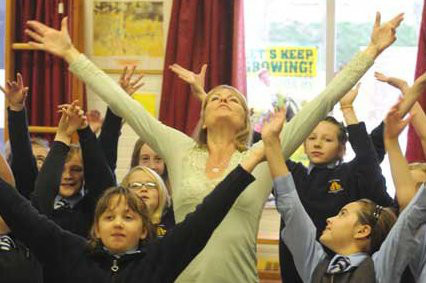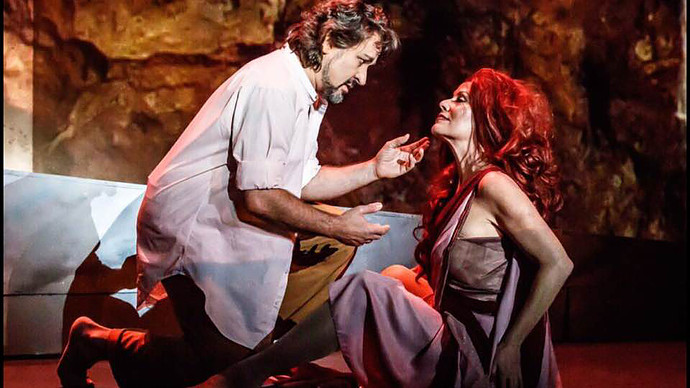
Felicity “Flic” Baldock and I worked together on the surtitles for Melbourne Opera’s Tannhäuser last year over glasses of wine, chocolates, lots of laughter and hard work. Felicity is a soprano who now imparts her knowledge to others. In this interview, full of more laughter, Felicity spoke to me about her own career and offered lots of advice for budding singers.
How did you become a singer? Can you give me a summary of your career?
I had no idea you could become a singer when I was growing up. I did all the musicals at school, I sang the leads, and whenever I went to career counselling and they said “what do you want to do?” I always said “I want to be a childcare worker.” That was my standard response to stop people asking me that question! (I did actually work as a childcare worker for a while; it was something I quite enjoyed). Anyway, someone said, “well, have you thought of singing?” and I said “You can do that for money??” [laugh] Then, as year 12 went on I had a wonderful year, I didn’t study at all and I did amazingly well at music, so I thought, I’ll just go audition for the con [SA College of Advanced Education which was affiliated with the Elder Conservatorium] … and they accepted me!

This was in Adelaide?
Yes, so this was about 1977… At the same time, I joined the opera company chorus and the State Opera of South Australia (SOSA) as a chorister, even though I didn’t really like opera… Dad used to play opera at 7 o’clock in the morning and it put me off! I love music theatre though. I actually wanted to do music theatre if I was going to do anything, but I got into the opera chorus and discovered it was quite fabulous. I learnt to love it.
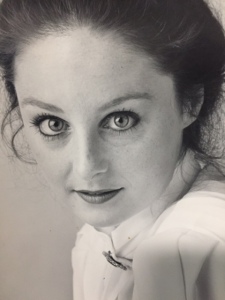
So, I started at college then too, and really didn’t enjoy it. I wasn’t happy with the teacher I was given, so I left and worked in a bank for three and a half years. In the meantime, I had joined the ABC recording choir that was conducted by James Christiansen, who as it turned out was also a very well respected teacher. When I unknowingly asked him about prospective teachers, he laughed at me and offered to teach me.
Well, I left the bank because I decided that wasn’t what I wanted to do, and went back to studying. At the end of my Associate Diploma in Theatre Arts – Opera, I was supposed to go on and do my Bachelor of Music, but that year the State Opera of South Australia (SOSA) offered me a place in their young artist’s programme, where I began singing principal roles.
When I was about 23 or 24, I was lucky enough to win an Adelaide Eisteddfod government scholarship and went to New York to study with Daniel Ferro who was one of the main teachers at the Julliard School.
During my time with SOSA I met and married Roger [Howell] and we continued to perform with SOSA for a number of years. Somewhere in there we spent 3 months in Milan studying with Maestro Bandera, before we decided to move to Melbourne. I returned to Adelaide, however, to sing Frascita in Carmen and Merab in Handel’s Saul at 8 months pregnant!
For the next couple of years, I travelled back and forth between Adelaide and Melbourne performing on the concert stage. When my son was 2, we went over and lived in Germany for two years where I didn’t do much singing. After spending some time auditioning in Germany, we decided to return to bring up our child in Australia, where I began a successful association with the Victorian State Opera (VSO).
After the VSO folded, a number of new opera companies opened… I performed in the inaugural season of Melbourne Opera, as Violetta in Traviata. I continued to perform for a number of years with MO.
From the age of about 18 I also performed regularly in oratorios and on the concert platform.
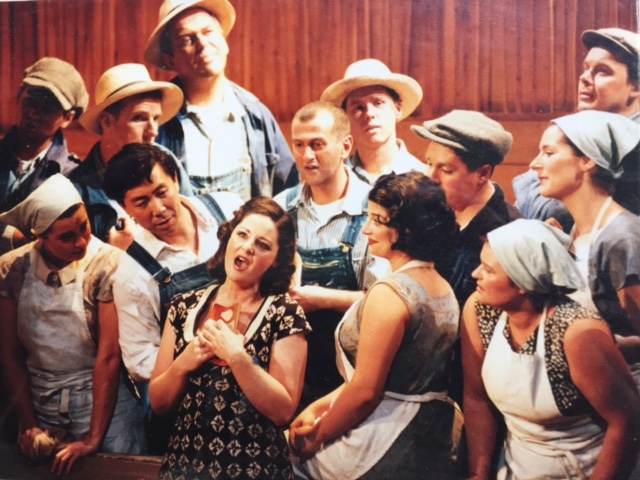
How did you end up as a singing teacher?
I had already been teaching singing off and on since my early twenties, but it wasn’t until I separated from my husband that I began teaching more consistently. I got a job in a couple of schools as a private singing teacher, which reminded me how much I enjoyed teaching singing. I gradually built up a successful singing studio, although I do continue to perform a few oratorios and a concert or two a year, and co-run a women’s community choir with a friend of mine, and that pretty much takes up my time… apart from SURTITLING, of course!! [laugh]
I was diagnosed with Crohn’s disease, I had sinus surgery, I had my tonsils out… all fairly major “dilemmas” as far as singing is concerned. They caused me a lot of problems so I started teaching more.
Who do you teach singing to?
I teach singing to anyone who wishes to learn! I teach the technique of singing which allows people to develop an understanding of how to use their instrument… so I teach breathing, support etc… the basics. I’m very good at establishing (or reconfirming) these basics. My students have a variety of singing styles, from choral singing, to opera, music theatre to pop… they all want to make sure that their technique is safe. However, anyone wishes to learn the technique of belting, I pass on to a very good friend of mine who is a highly respected belt teacher. She quite likes that because they come to her with a good basic technique. It’s a very different placement of the voice, but obviously with the same basic support.
I had one young girl who ended up going to London and she writes her own pop songs and does recordings… She wrote to me the other day and said “you know that CD of vocal warm-ups we made before I left? I still use it every time I go to work!”
The way you teach – is it the way you were taught yourself, or something you developed?
Jim [Christiansen] gave me a very sound grounding in the technique of singing, so of course I draw from this. While I use this technique, I think when you teach singing, you do it very much from how you feel it and how you sense it. Having said that, if you come across someone who doesn’t relate to the way you explain something, then you’ve got to find a different way of expressing it. Sometimes people can be very visual, and need visual approaches; other people need absolute anatomical understanding; other people need to just feel the physical sensations within their bodies to understand what they are doing… so one has be open to adjusting your teaching style to fit the individual student.
How does it feel to be teaching rather than performing? From my own experience, when girls I was teaching dance to would go off to the Royal Ballet, I felt pride as well as a bit of jealousy…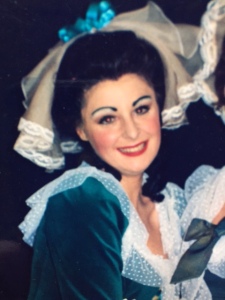
I worried that would happen, because I’ve seen some very sad cases in singing where people really are desperate to have been the singer themselves… and they are a bit uncomfortable with the success of their students. I think partly because I’m aware of that, I’ve been careful not to let that happen. There are times I’ve watched singers, even those I don’t teach, and I go “oh, I wish I could do that” but then I go “well, I’m not doing that” and I cut myself off. I’ve done a lot of adjudicating and I’m now able to look at singers and say “I like this, I like that, I don’t think you’re doing that well” without it being “I could have done it better than you”. I think I was good, and I only say that now, having been given a DVD recently and I saw myself at the age of 29 singing in a concert… I thought, “oh, actually I was quite good”. It was nice to be able to look back and see it, rather than do it from the point of view of “was I as good as I thought?”… “ok, well I could have been very good”… but I chose to have a family and to be close to home rather than constantly touring. I am very happy with my choice, and I have some really lovely students… just lovely, lovely people.
Do you miss performing?
Sometimes I do. But having been through my health issues, and as I grow older, I wonder how I would cope with the physical demands of singing. I was a high lyric coloratura soprano, and you lose some of that range as you get older. I do sometimes wonder what type of roles would I be singing now. Daniel said I’d end up doing something like Mimi if I kept going. Traviata probably would have been the biggest thing I’d sing vocally. I believe anything bigger wouldn’t have suited me vocally.
When you were performing, were you a confident person, or nervous going on stage?
I’ve always been nervous before I went on stage, but it was good nerves. I used to get slightly worried if I wasn’t nervous. If I got nervous early, I could breathe and control them. I remember one show I did in Adelaide… it was the Italian Girl in Algiers… and I was lying on a massage table being massaged by a eunuch [laugh]… and it was all set in pink and blue… and the curtain was about to go up and I was feeling quite calm and I suddenly went “what are my first words???” and I had this dreadful panic attack and I turned this guy Peter and said “what are my first words?!” and he’s going “I don’t know!!” and he’s panicking and the curtain came up and the overture was playing and I was thinking “what am I going to do??” … and they just came out of my mouth [laugh]. I think once I started singing, I was fine… as long as I knew my work.
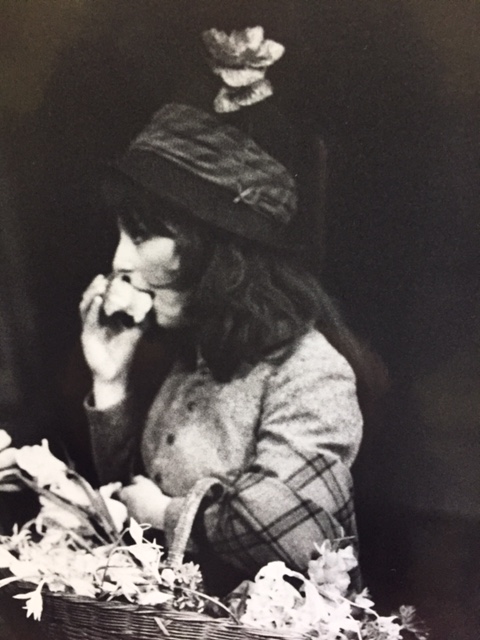
Did you have any particular way of warming up?
I always did a vocal warm up for a good half hour at home. I realised once I got into the theatre there was no way I was going to warm up; I was too busy being flitty and running around saying “have a lovely show”. So I always made sure I warmed up before I went in. I made sure I would either have a good meal about 3 or 4 in the afternoon… it could be a steak or something like that, that would digest slowly… or a pasta closer to the performance. A good meal and a good warm up and I was ready to go and sing! I loved it!!!
And how did you wind down after a show?
Ah… I couldn’t wind down! It’s funny, sometimes you’re exhausted but you come home, and you say “I don’t know what to do, I can’t sleep!” When I was younger, we would usually all go out together to an Italian trattoria afterwards and we’d sit and chat until we were absolutely zonked, and then go home. That was nice. But in those days we had four shows a week, so you could pace yourself quite well. We always had the night off before opening night.
Before you got diagnosed with Crohn’s, were you generally a healthy person?
I never worried about my health before Crohn’s disease. It’s a disease that really affects you because you get so exhausted. I have upper digestive Crohn’s so it included multiple mouth and throat ulcers… that was quite interesting to deal with because I had some concerts to do and I had to have large doses of medication to reduce the inflammation in my mouth and lips so that I was able to close both sides of my mouth at the same time so that I could sing (don’t even get me started on the throat ulcers). But, I managed and got through it. Before that, I’d just get a bit of a cold and then it would be fine.
I remember singing the Messiah with viral pneumonia one year, as there was no one to take over. I thought you can’t have the Messiah without a soprano, so I just sang very lightly and I said to them, “look, this is all I can manage” and they said that’s ok. Then people came up to me and said “ooh that was lovely” and I’m thinking “WHAT???” Good technique saved me all the time.
Did you do any other form of exercise to maintain your health?
No… unless you count walking my dog!!! I used to ride my bike and walk… I don’t think when you’re young it’s an issue. Not until you become middle aged and your body starts to spread in a way you never believed would happen! Tell all those young people out there to enjoy their bodies now!! [laugh]
And now, do you do anything physical?
Well, I did for a while, I went to a gym. I hate classes but I loved going in and just working out on the row boats and all that… and then I had my tonsils out and I haven’t gone back! It’s a time factor. Everyone says “your health comes first” but well, yes, you can’t pay for the health until you can earn money and it’s very tricky to fit that time in the middle of the day when you’re teaching all day. Teaching all day is so sedentary. I’ve got to stand up and walk around when I’m teaching because I get lethargic, and I get those awful sciatic pains from sitting all the time… all those office job issues, really.
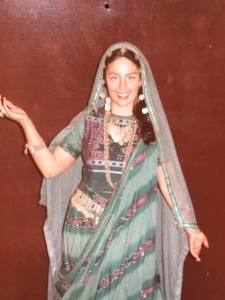 How many students do you teach in day?
How many students do you teach in day?
That’s difficult to answer… it varies from day to day. There are certain times that are particularly popular, like after school and after work, but I also teach people during the day.
I do have to remind myself to stop and eat lunch some days!! I know people who don’t stop, they teach from morning to night… I don’t know how they can focus their attention… maybe I give a lot during a lesson… I get tired.
I’m terrible at keeping to time! And if I have spare time after a student and they need extra I always go over.
And then suddenly it’s the night time! A good day is a Wednesday when I teach at a private school and run a choir there, then my choir at night, so I start at 9 in the morning and end at 9.30–10 at night.
You are a pescetarian. Is that how you’ve always been?
No, it’s probably only been the last four or five years. It was actually a conscious choice not to eat meat, not a Crohn’s issue. I didn’t eat fish for a few years, and then I started to notice I was missing things in my diet. Perhaps because of my Crohn’s, I can’t eat certain things, like legumes… and you can only eat so much tofu! So I started introducing fish, which of course made going out a much easier option. But I’ll spend a week or two without any fish, too, so yes, it was an ethical decision.
Do you have any advice to young singers or those starting out?
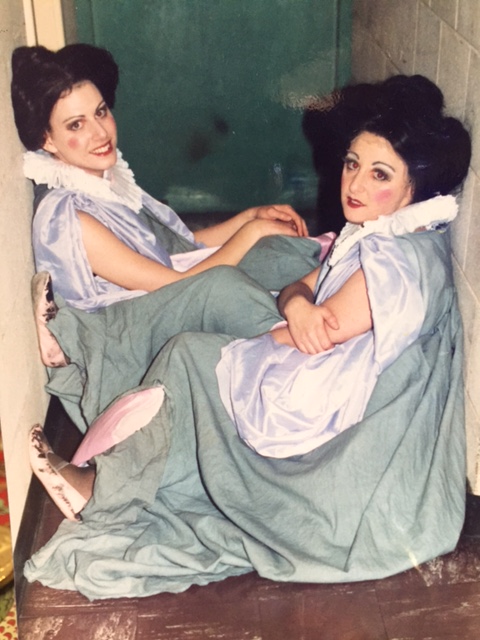 It’s very different these days than when I started out. There are more demands on singers now to look like their characters, or to look a certain way. I feel the art of illusion has been lost. Also the variety of music that voices are meant to contend with is quite scary.
It’s very different these days than when I started out. There are more demands on singers now to look like their characters, or to look a certain way. I feel the art of illusion has been lost. Also the variety of music that voices are meant to contend with is quite scary.
There’s always other stuff that stops them from actually working purely on their voice. I think this situation is slowly changing … and I hope I’m right, that I’m hearing people say ‘actually, we’re getting the looks but not getting the voices.’ Especially with big operas like Wagner. You get to a stage where you think, ‘I don’t want to hear Kylie Minogue singing Tannhäuser.’ I really believe young singers absolutely need to work on their technique. They need to know their vocal fach, and they need to know that they don’t have be skinny, they just need to be healthy, and they need to have a certain amount of stamina to cope with the vocal requirements. I’ve seen people shake on stage because their bodies are too small.
So go and do your dance classes. Do all that stuff. I would advise anyone to have enough classes to at least feel confident in being able to hold a routine without stressing yourself. And directors don’t make singers tap dance while they’re trying to sing! Dancers breathe very differently to singers, not to mention, you get puffed out when you dance!
I remember when I was at the first auditions for CATS and there was no way I could sing and dance.
CATS… well I do have a bug bear about shows like CATS… you have dancers on the stage giving the impression that they can both sing and dance at the same time, but you’ve got booth singers out the back who are not acknowledged at the end of the show.
Nobody can cut a dancer’s legs off and stick them on a singer’s body, that’s effectively what is happening in reverse… using a singer’s voice and a dancer’s body and making the audience believe they are one person. I think there’s a place for the old fashioned element of having both dancers and singers on stage, but they don’t all have to be doing both.
Look, CATS is a bit of a circus to me. It’s a wonderful illusion, but I think it’s very sad that the audience don’t seem to realise that the show involves singers who spend their lives learning to sing.
Another thing that concerns me is that new form of modern musical singing may prove to shorten the vocal life the singers.
There are different techniques for each style of singing. When you’re younger… 30ish and under… you can vary between many different styles with not much issue. After that, the body starts to need you to make a decision. Like, if you want to go into opera, which is really like the Olympics of singing, you would focus on that. You need to choose your area. Sometimes opera singers try to sing music theatre and music theatre people try to sing opera… and they aren’t the same. Although, there are some who do cross over successfully, most people can’t manage both, especially with the modern technique of belting.
There are old style musicals which classical singers sing and then there are musicals which are performed by less classical voices in an effort to appeal to the public. It’s really interesting, if you listen to the recording of West Side Story that Bernstein conducted, with Kiri Te Kanawa and Jose Carreras you hear the very classical sound that he wanted. It’s quite an eye opener. He was asked “then why did you allow the film version to be made with non-classical voices?” and he said “Because it was going to get my music out there.” He said it made it popular. The ranges are very different in the film… they’re not the same keys that he wrote originally.
I think the biggest thing that is lost in the young singers’ development in these last 20 years or so, is that they aren’t expected to do their stint in the chorus. It would be like being in the corps de ballet. You need to do that before you move into your solo realm. It doesn’t mean that you aren’t potentially a soloist from the word go, but you’ve got to learn your ensemble work; you’ve got to learn how to do that stuff because even as a soloist you have to work as an ensemble member.
It’s things like learning your craft backstage. I remember as a young girl being told not to touch the props! And I didn’t dare! And do not whistle! And don’t wear pearls on stage… bad luck! Always wear black for an oratorio, never wear red. [laugh] But you don’t learn those things in a course. You learn those from experience.
I remember being in the Verdi Macbeth chorus… the big chorus sing in the ball scene… and I sang my heart out and I came home and I thought: “oh ok, so that‘s what oversinging is.” And I never did that again. I learnt safely that ability to push yourself beyond what you can do and where you can’t go further. I think my voice strengthened from that experience but I learnt where to stop.
Everything’s shorter now. Rehearsal periods are shorter, and you don’t have time to play with your characters. That’s another thing… you still have to have a character as a chorister. I always remember Tom Lingwood saying in Boheme… he came in and stopped the chorus and said “right, who are you? where are you going? why are you coming here?” He made you find your characters, and that made such a difference even to be amongst it. You were somebody.
 And, learning to how to move in a crinoline!!! You learn to turn sideways otherwise you fall flat on your back. And you also learn how to go to the toilet in crinoline… that’s an interesting concept. I learnt so much from being in the chorus. Admittedly I was only 17 and I had been on stage at school, but I hadn’t had all that really professional experience.
And, learning to how to move in a crinoline!!! You learn to turn sideways otherwise you fall flat on your back. And you also learn how to go to the toilet in crinoline… that’s an interesting concept. I learnt so much from being in the chorus. Admittedly I was only 17 and I had been on stage at school, but I hadn’t had all that really professional experience.
And you do really have to be there for that half hour call. As I became a soloist I was there far earlier than the half hour call.
And learning to perform recitative… that’s a classic. There is so much misunderstanding of how to sing recitative. Make sure you learn the style from someone who understands it!
You learnt things like discipline and humility by being in the chorus, mixing with those who are fabulous… and others who were average. But in the long run they are the bunny out there doing it. You have to think “I’m fine, I’m the chorister, I have to support you, you are my colleague.” There are just some who are better at it than others. It boils down to that. Everyone does their best! And if they can’t do it, maybe they’ve been guided incorrectly.
I think a big thing is, when I was younger, you did not do a show if your teacher said no. And it’s such a fabulous feeling when they say yes, you’re ready. Or you say “do you think I can sing this?” and they say “no, it’s just not your voice type”. You can try but you can wreck your voice, you can wreck your career. I say to my youngies, I know it doesn’t mean anything now, but you imagine being my age and not being able to sing. I still feel young and I still want to sing and it would be depressing to have destroyed my voice by not taking this advice.
Don’t go out and get drunk every night. It really doesn’t work. Some people can. But usually there comes an age where you can’t recover quickly enough. Don’t go to a rock concert the night before a performance. I know that sounds sensible but I’m amazed how many people do these things! Care for your voice so there is less of a need to take treatments like cortisone. These sorts of drugs make you feel like your voice is fine and you can overuse it. This leads to damage which requires surgery, like being “vocal cleansed” as they call it these days… which is having your nodules removed. I’ve heard too many young singers that have done that, and they think it’s great… but they may not have learnt from the experience.
Don’t try to sing things that are too big for you. Sure, try them out in the safely of lessons. There are some things you’ll never be able to sing. That’s really depressing. I’d LOVE to do Tosca. I’ll never sing Tosca.
People say “eat pineapple” “don’t eat spicy food”. Everyone says “don’t smoke”. Strangely I smoked… and everyone did, in the 70s. My teacher used to smoke in my singing lessons, and we were fine. I’m not advocating smoking. Water is something I’d say yes to. Pineapple juice… some people swear by it. I can’t drink it because it affects my Crohn’s. Eat healthily, have your chocolate, be happy with it, and just treat yourself well. Find the foods that affect you personally. I suppose healthy is what is important and it’s what my age group were brought up with. We were brought up when there wasn’t all this KFC, McDonalds, all this sugar and processed food to the same degree.
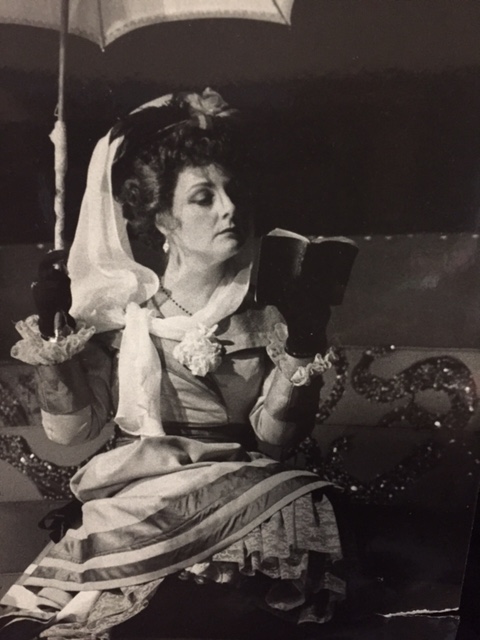
Do you have a Felicity Baldock cure for cold?
Peppermint oil on a tissue under your bra strap… fabulous for stuffiness! The oil needs to be placed away from your skin, but when it’s heated by your body, it creates a wonderful inhalant. I do use peppermint and other oils a lot. I have found that eucalyptus keeps me awake, so maybe don’t use that one at night.
Rest. Drink water. Keep resting. Soup. If I wasn’t vegetarian I’d say chicken soup – there’s something in chicken soup. It is a magic soup! But I have found certain vegetable stocks to be quite good, too. It’s about keeping your fluids up.
Oh, and because I had so many sinus issues, one of the things I did find out was that those nasal sprays that you’re meant to use for 4-7 days, ONLY use them for 4-7 days because they actually leave a residue in your nose. So you should also use a saline spray to wash out any residue, otherwise they set and lessen the width of your sinus tubes. I didn’t know, and it took me years to figure that out. Saline sprays are great. When you have a cold, or any sort of nasal congestion, you have a tendency to blow your nose a lot and try and dry it out.
But really, your nose should be well lubricated and it’s really important for singers to maintain that lubrication…otherwise everything dries out. Certain decongestants will do that too. And that makes it really difficult to sing.
IF YOU CAN’T SPEAK, DON’T SING! And don’t go to the doctor to get cortisone tablets to get through it!
The really important thing is, if you have an important show that you have to do, and you have to have medical assistance, DO NOT go out afterwards. Because you’ll talk, you think you’re fine, and you will suffer vocally. So go home, no matter how good you feel.
What is your favourite role?
I loved singing Violetta. I loved the emotion of it. It was exhausting from an emotional point of view. I loved singing Adina in L’Elisir d’Amore. I performed that with the VSO on a country tour, set in the wheatbelt of America. I enjoyed everything I sang. I loved singing Marsinah in Kismet as a young girl. I loved that role… and that’s a show opera companies could do because it needs really good singers. Beautiful music based on Borodin’s dances.
I did really enjoy every role, but Violetta was exciting. I was treated slightly differently in this important role… taken out and wined and dined! But it was exhausting! I was taken to the European Restaurant after opening night but I don’t remember much of that wonderful experience because I was so tired! But I was also at the peak of my Crohn’s too, at that stage, and had to deal with mouth and throat ulcers. Great role. And she’s a lovely person. I think everyone brings their understanding to a character so differently, and that has to come from somewhere inside you. So even if they’re a nasty character, you kind of have to believe in that character for it to work. And on that point: I don’t think there’s enough drama taught now in courses. When I was at University we did three hours of drama, incorporating nonsense poems, improvisations and recitations and we would use these things in our ensemble work.
One of my greatest disappointments in today’s courses is the removal of musical coaching and the lessening of the vocal lesson times and face-to-face contact.
Thank you Felicity! See you soon for Lohengrin surtitles…


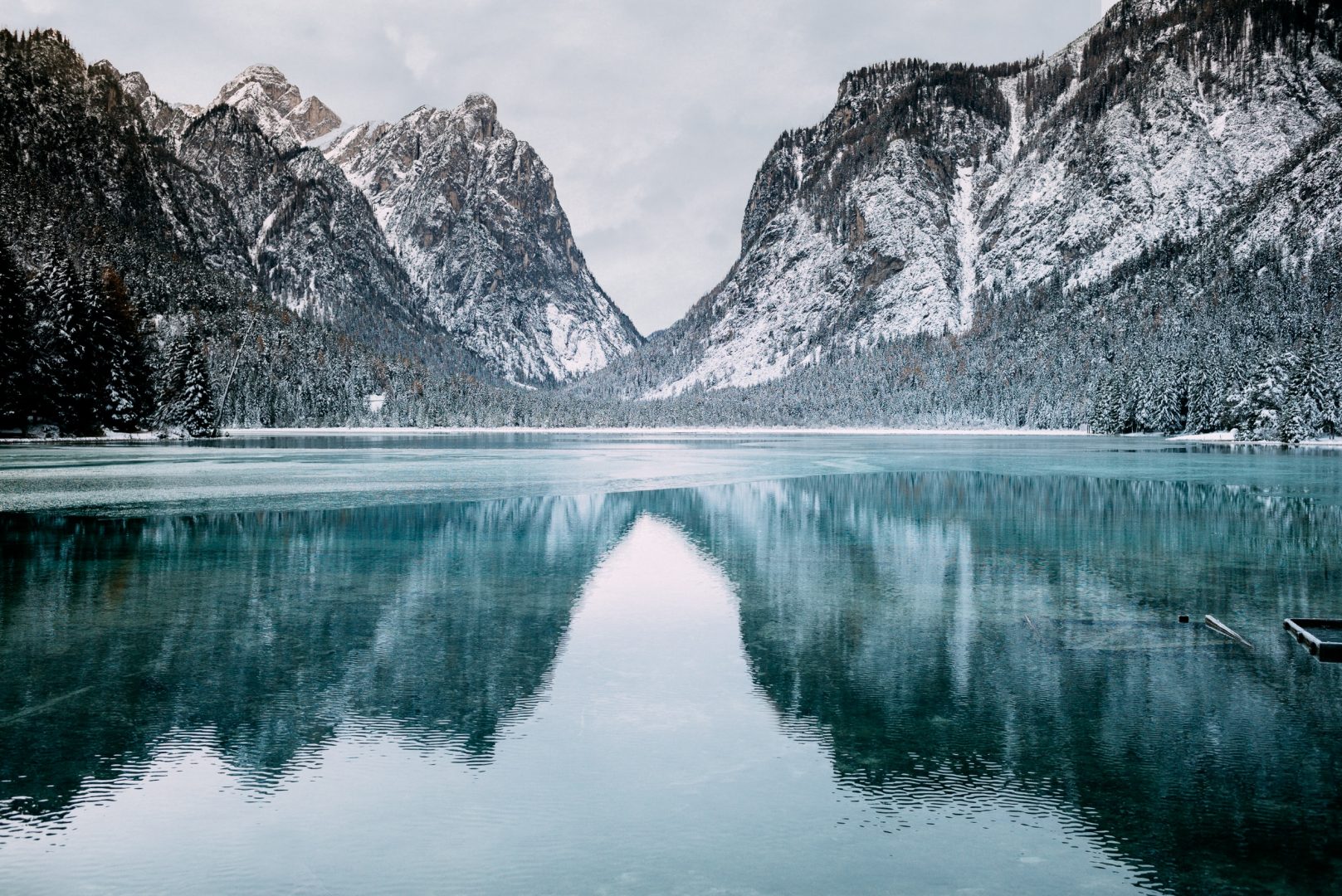


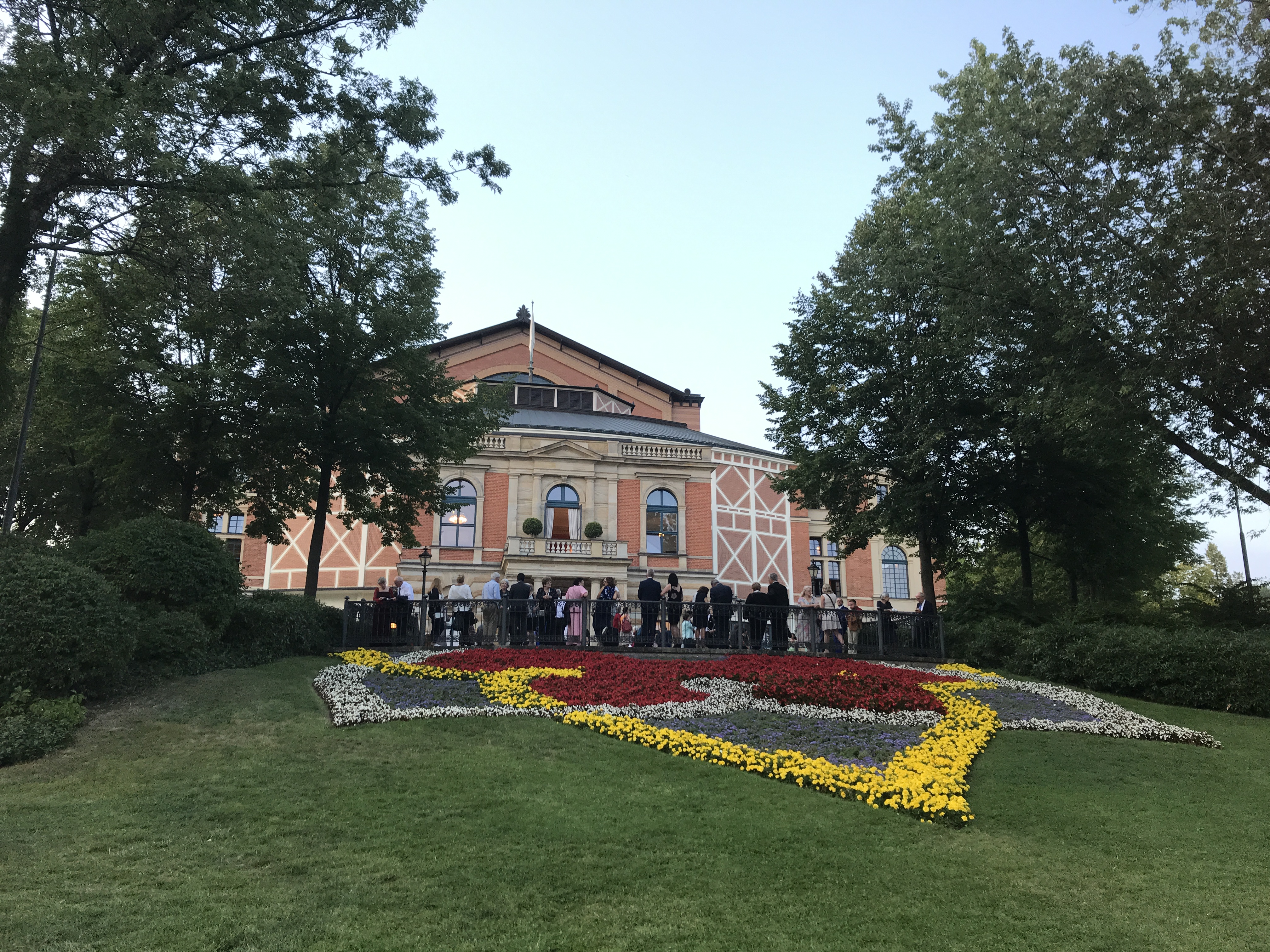

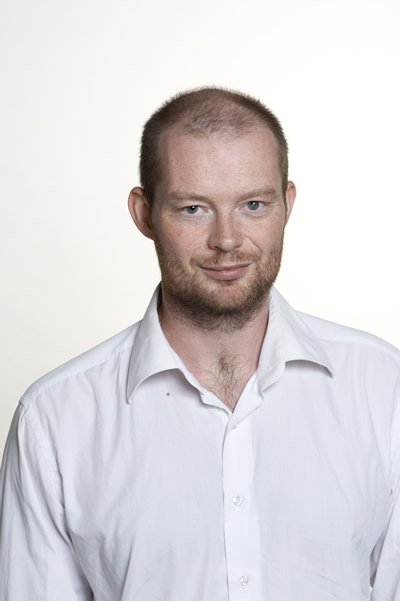 This interview is of Hrólfur Sæmundsson who sang the role of a dashing Telramund in the recent production of Lohengrin at Melbourne Opera, tatts and all. A wonderful singer and a lovely, friendly person to boot. The interview is with my questions, but as I ran short of time during his visit here I asked his partner Claudia de Sessi to interview him on their flight back! Thank you gorgeous Claudia for doing this.
This interview is of Hrólfur Sæmundsson who sang the role of a dashing Telramund in the recent production of Lohengrin at Melbourne Opera, tatts and all. A wonderful singer and a lovely, friendly person to boot. The interview is with my questions, but as I ran short of time during his visit here I asked his partner Claudia de Sessi to interview him on their flight back! Thank you gorgeous Claudia for doing this.
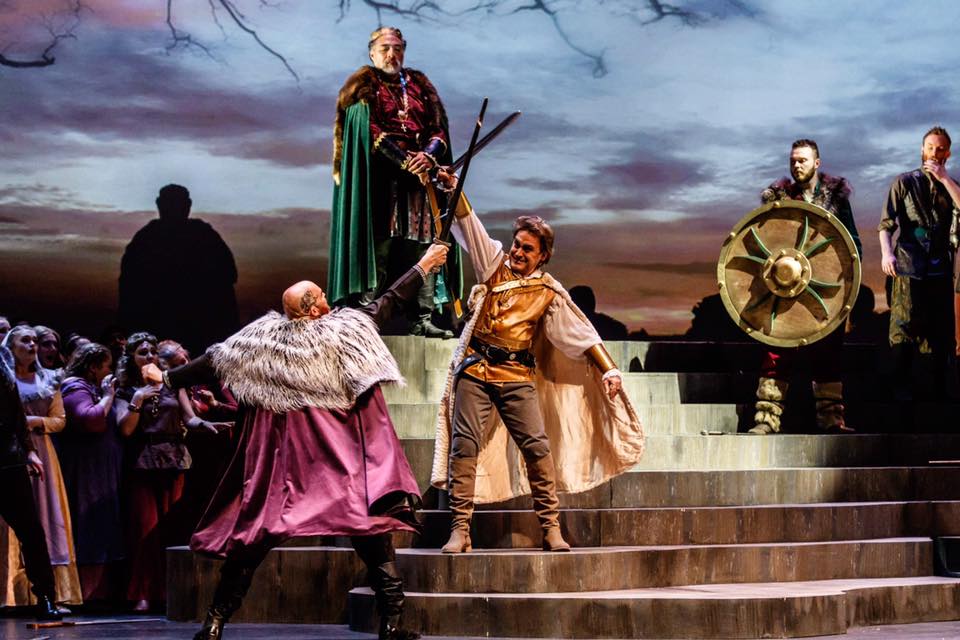








 How many students do you teach in day?
How many students do you teach in day? It’s very different these days than when I started out. There are more demands on singers now to look like their characters, or to look a certain way. I feel the art of illusion has been lost. Also the variety of music that voices are meant to contend with is quite scary.
It’s very different these days than when I started out. There are more demands on singers now to look like their characters, or to look a certain way. I feel the art of illusion has been lost. Also the variety of music that voices are meant to contend with is quite scary. And, learning to how to move in a crinoline!!! You learn to turn sideways otherwise you fall flat on your back. And you also learn how to go to the toilet in crinoline… that’s an interesting concept. I learnt so much from being in the chorus. Admittedly I was only 17 and I had been on stage at school, but I hadn’t had all that really professional experience.
And, learning to how to move in a crinoline!!! You learn to turn sideways otherwise you fall flat on your back. And you also learn how to go to the toilet in crinoline… that’s an interesting concept. I learnt so much from being in the chorus. Admittedly I was only 17 and I had been on stage at school, but I hadn’t had all that really professional experience.
 Not only is Sarah a wonderful and beautiful performer (with a great sense of humour), she is also a yoga teacher which is why I’ve always wanted to hear more of her story.
Not only is Sarah a wonderful and beautiful performer (with a great sense of humour), she is also a yoga teacher which is why I’ve always wanted to hear more of her story.